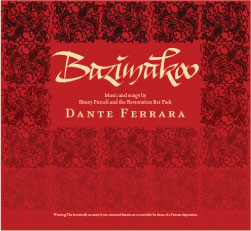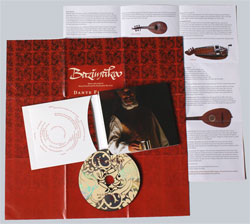

Bazimakoo
In the depths of the British Library lie various editions of ‘Catch That Catch Can’ and ‘The Catch Club’. These books contain arguably the filthiest songs in the English language, the foremost composer of which was Henry Purcell (1659-1695).
Released in 2007, Bazimakoo has 33 tracks (24 songs and 9 instrumentals) with a total duration of 76’27. Fourteen of these tracks have never previously been recorded.
Bazimakoo is for those who like their early music on the gritty, earthy side, featuring catches and rounds by Henry Purcell and his contemporaries - The Restoration Rat Pack! This is a feast of tastefully arranged earthy humour interspersed with instrumentals using the cittern, hurdy-gurdy, English guittar, Milanese mandolin and bass colascione. Much of this material is performed in the new show ‘Finery & Filth’.
This groundbreaking CD is the first to focus on the repertoire of the Catch Club. It also uses four rare antique instruments.
The beautifully designed packaging also contains a free poster. Although the CD carries a lyrics warning, it is entirely suitable for anyone with a sense of humour sense of history and a desire to celebrate all great things English!
Extracts from recently published reviews…
It's all clean dirty fun and the CD deserves success with a wide range of collectors.
Bazimakoo is a benchmark CD with which I shall assess many others which are, not rarely, perfunctory in consideration of presentation of the background.
Peter Grahame Woolf
www.musicalpointers.co.uk
Bazimakoo is a delightful disc in all aspects, at the same time deeply cultural and pleasing, knowing how to unite passion for meticulous research with a joyful desire for fun, and all with great style.
Giancarlo Bolther (Written originally in Italian, translated by DF)
www.rock-impressions.com
The essential aspect worth noting about Bazimakoo is its bawdy humor. The title is a franglais corruption of the French “baisez mon cul,” which literally means “kiss my arse,” and is attributed to Shakespeare.
It’s difficult not to chuckle at the songs, which have the same solemn cadence as liturgical compositions of the period, and the same mellifluous blend of male choral voices—but the lyrics are jaw-dropping. The low bathroom and bedroom humor are rendered all the more effective by their solemn and intricate harmonies.
Charles Rammelkamp, 2008 for Renaissance Magazine, USA.